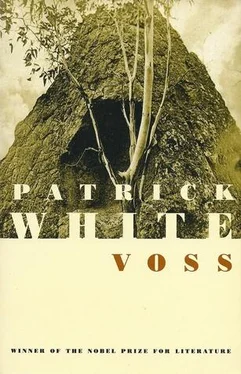Thus hopeful, it was obvious she must be at his side, and, in fact, he heard a second horse blowing out its nostrils, the sound so pitched he would have known it to be morning without the other infallible sign of a prevailing pearliness. As they rode, the valleys became startling in their sonorous reds, their crenellations broken by tenuous Rhenish turrets of great subtlety and beauty. Once, upon the banks of a transparent river, the waters of which were not needed to quench thirst, so persuasive was the air which flowed into and over their bodies, they dismounted to pick the lilies that were growing there. They were the prayers, she said, which she had let fall during the outward journey to his coronation, and which, on the cancellation of that ceremony, had sprung up as food to tide them over the long journey back in search of human status. She advised him to sample these nourishing blooms. So they stood there munching awhile. The lilies tasted floury, but wholesome. Moreover, he suspected that the juices present in the stalks would enable them to be rendered down easily into a gelatinous, sustaining soup. But of greater importance were his own words of love that he was able at last to put into her mouth. So great was her faith, she received these white wafers without surprise.
After lingering some time with their discoveries, the two figures, unaffected by the interminable nature of the journey, and by their own smallness in the immense landscape, remounted their stout horses and rode on. They were for ever examining objects of wonder: the wounds in the side of a brigalow palm, that they remembered having seen somewhere before; stones that sweated a wild honey; and upon one memorable occasion, a species of soul, elliptical in shape, of a substance similar to human flesh, from which fresh knives were continually growing in place of those that were wrenched out.
All these objects of scientific interest the husband was constantly explaining to his wife, and it was quite touching to observe the interest the latter professed even when most bored.
From this luminous state Voss returned for a moment in the early morning. His faculties promised support, and he felt that he was ready to meet the supreme emergency with strength and resignation.
All that night, the blacks, although stupefied by gorging, had been turning in their sleep beside the fires, as if they were full but not yet fulfilled. About the grey hour several old men and warriors arose. Almost at once their bodies became purposeful, and they were joined by the guardian of the white man, who went and roused the boy Jackie.
Now, Jackie, whether sleeping or not, immediately went through all the appearance of waking, and himself gave an imitation of purposefulness, while shuddering like black water. He was still terribly supple and young. His left cheek bore the imprint of a bone-handled clasp-knife given him by Mr Voss, and upon which he had been lying. It was perhaps this sad possession, certainly his most precious, which had begun to fill him with sullenness. He was ready, however, to expiate his innocence.
All moved quickly towards the twig shelter, an ominous humpy in that light. Jackie went in, crowded upon by several members of his adoptive tribe still doubtful of his honesty. But the spirits of the place were kind to Jackie: they held him up by the armpits as he knelt at the side of Mr Voss.
He could just see that the pale eyes of the white man were looking, whether at him or through him, he did not attempt to discover, but quickly stabbed with his knife and his breath between the windpipe and the muscular part of the throat.
His audience was hissing.
The boy was stabbing, and sawing, and cutting, and breaking, with all of his increasing, but confused manhood, above all, breaking. He must break the terrible magic that bound him remorselessly, endlessly, to the white men.
When Jackie had got the head off, he ran outside followed by the witnesses, and flung the thing at the feet of the elders, who had been clever enough to see to it that they should not do the deed themselves.
The boy stood for a moment beneath the morning star. The whole air was trembling on his skin. As for the head-thing, it knocked against a few stones, and lay like any melon. How much was left of the man it no longer represented? His dreams fled into the air, his blood ran out upon the dry earth, which drank it up immediately. Whether dreams breed, or the earth responds to a pint of blood, the instant of death does not tell.
*
Also early in the morning, Mrs Bonner started up from the chair in her niece’s room in which she had been, not exactly sleeping, but wrestling with horrid tangible thoughts. She jumped up, out of the depths, and saw that it was Laura who had rescued her. The young woman was moving feebly on her sick-bed, while calling out with what remained of her strength after the bleedings to which she had been subjected on several occasions.
The aunt looked at her niece and hoped that she herself would know how to act.
‘What is it, my dear?’ begged the frightened woman. ‘I know that I am foolish, but pray that I may rise above my foolishness. Just this once. If only you will tell.’
Realizing that there were cupboards which she would never be allowed to arrange had stamped an expression of confusion, even of resentment, on Mrs Bonner’s good face. She stood looking at her niece, who was trying to disburden herself, it was at once clear, for veins stood out in her throat, and she was streaming with moisture and a peculiar grey light. This latter effect was caused, doubtless, by the morning, as it came in at the window, and was reflected by the panes, the mirrors, and various objects in ornamental glass.
‘O God,’ cried the girl, at last, tearing it out. ‘It is over. It is over.’
As she spoke, she shivered, and glistened.
The aunt put her hand on the niece’s skin. It was quite wet.
‘It has broken,’ said Aunt Emmy. ‘The fever has broken!’
She herself had dissolved into a hopeful perspiration.
Laura Trevelyan was now crying. She could not stop. Mrs Bonner had never heard anything quite so animal, nor so convulsive, but as she was no longer frightened, she did not pause to feel shocked.
‘Oh, dear,’ relief had made the old thing whimper, ‘the fever is broken. We must praise God.
‘Eternally,’ she added, and heard it sound exceptionally solemn.
But Laura Trevelyan cried.
Presently, when she was calmer, she said:
‘At least I shall look forward to seeing my little girl before very long.’
‘Then you know that I disobeyed your wishes?’ Aunt Emmy gulped.
‘I know that my will wavered, for which I hope I may be forgiven,’ her niece replied. ‘ He will forgive, for at that distance, I believe, failures are accepted in the light of intentions.’
‘Who will forgive, who condemn, I cannot say, only that nobody has ever taken into consideration my powers of judgement,’ Mrs Bonner complained. ‘No, I am a muddler, it has been decided, and not even my own family will allow that I sometimes muddle right.’
Laura, by this time too exhausted to submit to more, was falling into a sleep that appeared peaceful enough, at least, to listen to, and watch.
When she had wiped her smeary face with an Irish handkerchief that could have been a dish-clout, Mrs Bonner’s first impulse was to wake her husband, such was her relief, and tell him there was now some possibility that their niece might recover from her terrible illness. She did go a little way along the passage, before thinking better of it. For Mr Bonner, a man of reticence in moments of emotion, might not have done justice to the situation. So she hugged her joy selfishly, in the grey house in the still morning, and let her husband sleep on.
Читать дальше












